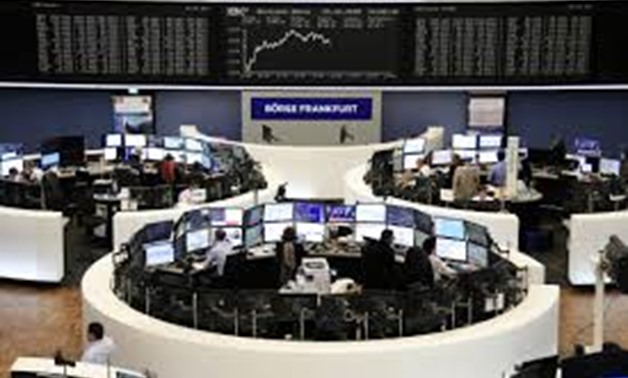
The German share price index DAX graph is pictured at the stock exchange in Frankfurt, Germany, October 25, 2018. REUTERS/Staff.
LONDON (Reuters) - World share markets soared on Friday as hopes built that the United States and China were starting to repair their badly damaged trade relations.
Those hopes rose after a phone call between U.S. President Donald Trump and Chinese President Xi Jinping, triggering a global surge in risk appetite. Metals and swathes of trade-sensitive currencies and bond markets gained, but it was equities that saw the most explosive action.
“When Trump wants to bump the market ahead of the mid-terms, the market likes it,” said Saxo Bank’s head of FX strategy, John Hardy, referring to next week’s mid-term U.S. elections.
A jubilant Asian session, which included 2.5 to 4 percent gains for most of region’s big markets, put emerging-market stocks .MSCIEF up 3 percent and on course for their best day and week since early 2016.
In Europe, Germany's export-heavy DAX .GDAXI jumped 1.5 percent in its best start since July. Wall Street futures ESc1 were also up almost 1 percent before the monthly installment of the U.S. non-farm payrolls report. [.EU]
SPONSORED
A Reuters poll shows economists expect a 190,000 rise in U.S. jobs and 0.2 percent increase in hourly earnings, after a 0.3 percent increase in September.
Those numbers will follow data this week that showed slowing factory growth around the world, but for the day at least those worries were being soothed by the brighter U.S.-China mood.
The other focus is whether strong U.S. earnings reports push 10- and 30-year U.S. bond yields up toward 3.5 percent. [/US] European bond yields were rising.
In currency markets, the dollar diped to a week-low .DXY, though it held its ground against the safe-haven yen at 113.00 yen JPY=.
China's yuan strengthened to a high of 6.9092 per dollar in onshore markets CNY=CFXS and also gained in offshore trade CNH=D4, pulling away from the sensitive 7 to the dollar level.
The euro edged up 0.15 percent to $1.1426 EUR=. The Australian dollar gained 0.5 percent to $0.7240 AUD=D4 and sterling rose to $1.30 on hopes London is closing in on transitional deal for when it leaves the EU next year.
If the pound doesn’t skid later it will be its second-best week of the year so far. Thursday was its best day of the year.
“Were it not for Brexit uncertainty, the Bank of England would probably have laid the groundwork (at its meeting on Thursday) for its next rate hike,” BNP Paribas analysts said in a note.
SOUR APPLE
The expected rise for Wall Street is likely to be tempered by Apple shares (AAPL.O), which tumbled 5.6 percent in premarket trading after it warned on Thursday about its upcoming holiday season sales.
In an interview with Reuters, Apple CEO Tim Cook said some of the forecast disappointment was explained by releasing its top-end iPhone models, the XS and XS Max, in the fiscal fourth quarter.
Cook also said foreign exchange rates would have a $2 billion negative impact on Apple’s sales forecast. Cook added the firm was also “seeing some macroeconomic weakness in some of the emerging markets,” although he didn’t specify which ones.
The tech sector has taken a beating on Wall Street over the last month and Apple’s weak forecast fed into the same investor fears that have caused shares of Facebook (FB.O), Amazon (AMZN.O) and Google (GOOGL.O) to tumble.
In commodity markets, industrial metals led the charge on the hopes a Trump-Xi trade deal would prevent China’s resource-hungry economy faltering.
Three-month copper on the London Metal Exchange CMCU3 climbed as much as 2.8 percent to $6,264 a ton, its highest in a week.
Other base metals were up across the board too, with zinc CMZN3 rising 2.5 percent, nickel CMNI3 climbing 2.9 percent, lead CMPB3 up 3.1 percent and aluminum CMAL3 gaining 1.9 percent.
Oil prices were less energetic but had managed to reverse early Asian losses, with U.S. crude CLc1 last at $63.51 a barrel and Brent crude LCOc1 a touch higher at $72.99.
They were restrained by a report that the U.S. government has agreed to let eight countries, including close allies South Korea and Japan, as well as India, keep buying Iranian oil after it re-imposes sanctions.
“Oil prices look to remain under pressure, as fears of global oversupply have returned with a vengeance,” said Ashley Kelty, oil and gas research analyst at Cantor Fitzgerald Europe.


Comments
Leave a Comment